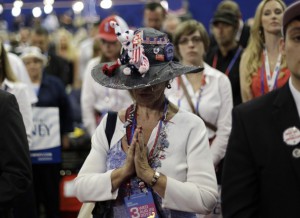God-Awful Political Conventions

Republicans and Democrats can’t really find much to agree on these days, and are often seen squabbling in Congress about issues as controversial as tax reform to ones as simple as whether or not the Capitol building should receive funding for much-needed repairs. This squabbling only gets more heated on national television, as politicians from both parties do their best to discredit and disgrace their political opponents in front of millions of Americans.
But don’t worry, because Republicans and Democrats can still come together on one issue: God. Both parties showed us during their presidential conventions just how much they absolutely love God, and how much they wanted the rest of us to love God, too.
Let’s start with the Republicans. As was widely reported, Republicans repeatedly referenced God at their convention and in their party platform. Their platform (the entirety of which can be found here) states that the primary role of government is to protect the “God-given, inalienable, inherent rights of its citizens.” The words “God-given” is repeated throughout the platform, from references to our “God-given right to self-defense” to our “God-given energy resources.” In regards to the Republican party’s support of private school vouchers, the platform says that a young person’s ability to achieve in school must be “based on his or her God-given talent and motivation” and not on economic status.
While the problem with vouchers can be discussed in another article, anyone reading this platform gets the idea that the Republican Party feels that our country and everyone in it owes their existence and prosperity to God. The Republican Party is firm in their belief that America is in fact a country founded on Judeo-Christian values, and their platform is strongly supportive of the “right of students to engage in prayer at public school events in public schools” and of “every citizen’s right to apply religious values to public policy and the right of faith-based organizations to participate fully in public programs without renouncing their beliefs, removing religious symbols, or submitting to government-imposed hiring practices.”
This fundamentalist reliance upon the Judeo-Christian God is mirrored by the Democratic Party’s 2012 platform, although admittedly to a lesser degree. The Democrats used the “God-given” phrase once themselves while referencing the need for a government that stands up “for the hopes, values, and interests of working people, and gives everyone willing to work hard the chance to make the most of their God-given potential.” However, this reference was inserted only after Republicans discovered and subsequently complained that the Democrats’ 2012 platform omitted any explicit reference to God. What Republicans forgot to mention was that even though the Democrats didn’t initially have a reference to God in their platform, they did have a whole section devoted to the role of faith in politics and in every American’s personal life.
This section begins by stating that “faith has always been a central part of the American story, and it has been a driving force of progress and justice throughout our history,” and goes on to claim that “our nation, our communities, and our lives are made vastly stronger and richer by faith and the countless acts of justice and mercy it inspires.” These statements, in addition to just not being historically accurate, seem to suggest that faith is a prerequisite for the foundation of a democracy and is the sole inspiration for charitable acts. This is beyond offensive to the many proud non-religious Americans who support their country and perform charitable acts all without the influence of faith or any other sort of dependence on supernatural belief. The section on faith ends with a constitutional doozy by stating that there is no conflict between government support of “faith-based institutions and respecting our Constitution, and a full commitment to both principles is essential for the continued flourishing of both faith and country.”
What both parties don’t seem to understand is that they alienate potential non-religious supporters by placing such a heavy emphasis on the role of faith in our government and in our day-to-day lives. This emphasis seems to insinuate that by not believing in a God, non-religious citizens aren’t really Americans, and that the non-religious community is less willing or able than the faith-based community to help those that are in need. Hopefully, in the future politicians will realize just how alienating their words can be to non-religious Americans, and will make an attempt to include the interests of every citizen in their subsequent party platform. Barring that, humanist Americans will have to stand up for themselves and work to ensure that our elected officials truly represent all of their constituents, and not just those that believe in a god or gods.
